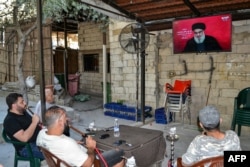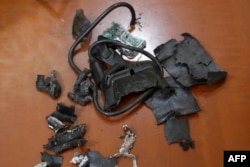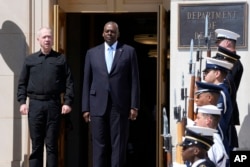Israeli forces late Thursday carried out their most intense strike on southern Lebanon in nearly one year of war, increasing tensions between the two countries despite international calls for calm.
In the operation, Israel’s military said its jets struck about 100 multiple-rocket launchers in southern Lebanon that were set to be fired immediately toward Israel.
There were no immediate reports of casualties. The attack consisted of more than 52 strikes across southern Lebanon after 9 p.m. local time, according to the Lebanese state news agency NNA.
The United Kingdom has called for a cease-fire between Israel and Hezbollah, and the United States is “afraid and concerned about potential escalation,” White House spokesperson Karine Jean-Pierre told reporters.
Earlier on Thursday, Hezbollah chief Hassan Nasrallah acknowledged that this week’s deadly explosive attacks in Lebanon on the militant group’s communications devices were a “severe blow,” while contending that Israel had crossed a “red line” in carrying out the operation.
The attacks killed at least 32 people and wounded another 3,000 as unsuspecting Hezbollah militants and others answered messages on their pagers and tried to carry on conversations on their walkie-talkies, only to have them explode in their hands.
The attacks, on Tuesday and Wednesday, were widely believed to have been carried out by Mossad, the Israeli intelligence agency, although Israel has neither confirmed nor denied being involved.
“Yes, we were subjected to a huge and severe blow,” Nasrallah said. “The enemy crossed all boundaries and red lines.”
As usual, Nasrallah spoke by video from an undisclosed location. Iran-backed Hezbollah has typically convened a rally for supporters to watch his speeches on a big screen, but this time it did not.
Because of the lethal devastation from the attacks, Lebanon has banned passengers flying from Beirut’s international airport from carrying pagers or walkie-talkies on board their flights. The ban applies to both checked and carry-on luggage, as well as cargo.
Security experts in the Middle East and the United States told U.S. media outlets this week that they thought Israeli agents had somehow intercepted a shipment of the pagers from a company in Budapest, Hungary, and had added the explosives to the devices before they arrived in Lebanon and were handed out by Hezbollah.
But a New York Times account disputed that scenario. The newspaper reported that its sources in the intelligence community said Israel had created a front company, B.A.C. Consulting, to manufacture the electronic devices and incorporate batteries laced with the explosive PETN and links so the devices could be detonated remotely.
The company produced some ordinary pagers for sale on the commercial market, the newspaper said, but the singular aim was to manufacture the lethal devices to deploy in Israel’s fight against Hezbollah.
The first batches of the pagers were shipped to Lebanon in the summer of 2022 in small numbers, but production was quickly ramped up after Nasrallah denounced the use of cellphones because they could be tracked by Israeli intelligence and the low-tech pagers and walkie-talkies could not.
Hsu Ching-Kuang, founder of Taiwan-based manufacturer Gold Apollo, told reporters Wednesday that his company did not manufacture the pagers, even though its corporate markings were found on them when the remains of the exploded devices were examined Tuesday.
He said Gold Apollo had authorized its brand to be used on devices produced and sold by B.A.C. in Budapest.
Meanwhile, Israel’s military announced the arrest of an Israeli citizen suspected of involvement in an Iran-backed plot to kill Israeli officials.
Israeli authorities said in a statement the person arrested was a businessman with connections in Turkey who attended at least two meetings in Iran and that potential targets of the plot included Prime Minister Benjamin Netanyahu and Defense Minister Yoav Gallant.
The arrest took place last month, the statement said.
Israeli defense chief Gallant said Thursday that he spoke by telephone with U.S. Defense Secretary Lloyd Austin about the situation in the region, including “Israel’s defense against Hezbollah threats.”
The Pentagon said Austin reiterated “unwavering U.S. support for Israel in the face of threats” from Iran, Hezbollah and other Iranian partners in the region.
“The secretary emphasized the U.S. commitment to deterring regional adversaries and efforts to de-escalate tensions across the region,” a Pentagon spokesperson said.
Following diplomatic talks in Paris on Thursday, British Foreign Secretary David Lammy called for an immediate cease-fire between Israel and Hezbollah.
“Tonight, I’m calling for an immediate cease-fire from both sides,” he told Reuters. “We are very, very clear that we want to see a negotiated political settlement so that Israelis can return to their homes in northern Israel and, indeed, Lebanese to return to their homes.”
The pager and walkie-talkie attacks followed Israel’s announcement that it was broadening its goals in the war against Hamas militants in Gaza to include the securing of northern Israel from Hezbollah rocket attacks.
Some information for this report came from The Associated Press, Agence France-Presse and Reuters.





